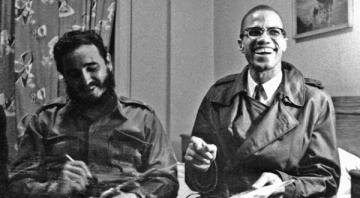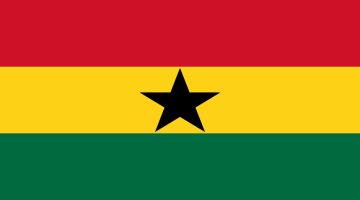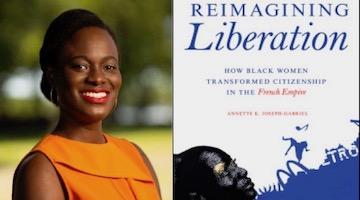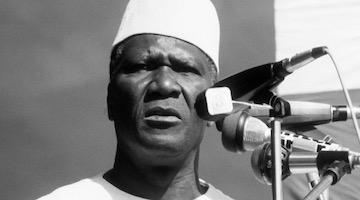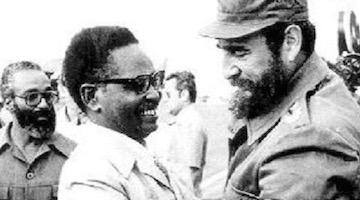A pamphlet written 70 years ago by an exiled Black American communist reveals an African continent seething to break free from European colonization.
“The colonial peoples’ resistance is at the very core of the present world struggle.”
When it comes to that great generation of mid-twentieth century Black communists, William Alphaeus Hunton, Jr. is perhaps not as well known as W.E.B. Du Bois, Claudia Jones, Paul Robeson, or William L. Patterson. Yet Hunton is an important figure who dedicated his life to fighting for African liberation and whose radical intellectual legacy can be found in an archive of journals, pamphlets, and monographs.
Born in Atlanta in 1903 to middle class activist parents, Hunton studied at Howard, Harvard, and New York University. He became active in union organizing, joined the Communist Party, worked with National Negro Congress and the Civil Rights Congress (CRC), and served as the educational director and later the executive secretary of Council on African Affairs (CAA). It was with the CAA that Hunton did some of his most important work. He edited the CAA journals New Africa and Spotlight on Africa and worked tirelessly to publicize the history of Africa and agitate for pan-African struggles against colonialism and imperialism. Hunton was also a regular contributor to Freedom, an anti-imperialist newspaper founded by his CAA comrade Paul Robeson, and would go on to co-found the important radical journal Freedomways.
Hunton’s work, the work of the CAA, were curtailed by a number of US government entities, including the Federal Bureau of Investigation, the Subversive Activities Control Board, and the House Committee on Un-American Activities. The CAA was cast as a communist front organization and Hunton was sentenced to six months in prison for refusing to turn over CRC bail fund records. Unable to continue his work after his release from prison and the dissolution of the CAA in 1955, Hunton eventually migrated to Sekou Toure’s Guinea before moving to Kwame Nkrumah’s Ghana to work with W.E.B. Du Bois on the Encyclopedia Africana. Hunton was expelled from Ghana a year after the 1966 coup that overthrew Nkrumah. He briefly returned to New York before relocating to Zambia, where he died in 1970. A full treatment of Hunton’s life is found in Alphaeus Hunton: The Unsung Valiant, a biography self-published by his wife, activist Dorothy Hunton. Unsung Valiant was recently reissued by International Publishers.
A useful introduction to the nature and scope of Hunton’s political and intellectual engagements can be found in his 1950 pamphletAfrica Fights for Freedom, reproduced below. Despite its brevity, Africa Fights for Freedom is astonishing in its comprehensive analysis of the activities of French, British, and US imperialists on the Continent, as well as its documenting of the scale and scope of African protest and resistance. As Hunton writes, the fundamental demands throughout Africa were “For democracy, political power and independence; for the return of land robbed from the Africans; for an end to the profiteering and strangle-hold of the monopolies; for a decent living wage and better living standards; for the right to manage and develop their country for their own benefit.” And as Eslanda Goode Robeson wrote in the foreword to Africa Fights for Freedom, the struggles Hunton documents were “very much in step” with Black struggles for jobs, civil rights, and dignity in the United States, as well as with the drive of the oppressed people throughout the world for peace and freedom.
Africa Fights for Freedom [1950]
Alpheaus Hunton
Sir Percy Sillitoe, head of M.I. 5, secret section of the British Military Intelligence Service, made a very hush-hush flying trip to British East Africa and down through Rhodesia to South Africa not long ago. “In the past few months,” reported South Africa’s Rand Daily Mailin taking note of Sir Percy’s visit, “almost every police chief in British Africa has been to Scotland Yard. They have been schooled carefully in the dangers of Communism in their territories.”
Clearly, British officialdom is worried. Wasn’t Africa, with its tremendous untapped resources and enslaved colonial labor, supposed to save British imperialism from gasping its last? Wasn’t it supposed to solve the economic dilemmas of the whole United States-Western European axis? Doesn’t American Big Business assume that it has only to move into Africa—in a big way, that is—and the guaranteed profits on its investments of surplus capital, as promised by Mr. Truman’s Point-Four Program, will be as good as money in the bank? Well, Sir Percy and his colleagues know that it won’t be quite so simple.
The present and would-be exploiters of Africa have left just one thing out of their precise calculations and pat blueprints—the people of Africa. The 180 millions of them are rising, organizing and fighting with increasing strength to break their chains, and this spells the nemesis of colonial exploitation in the last continent left to the imperialist gang.
How long can they hold Africa? With the help of guns from the United States, arsenal of world imperialism, the government agents of European and American monopoly are engaged in a brutal war of repression against the African people in a desperate effort to postpone their V-A Day as long as possible. Since World War II, national revolts and wide-spread strikes have swept every area of Africa. Take the French colonies, for example. In Algeria, at the very time when we were celebrating V-E Day, French authorities slaughtered 60,000 people and put scores of thousands more in jails and concentration camps. In Madagascar suppression of a national revolt was achieved only after two years and with the killing of 90,000 Malagasy patriots. In French Morocco, Tunisia and French West Africa, strikes involving many thousands of miners and railway workers were broken only by French troops using armored cars and tanks.
“In Algeria, at the very time when we were celebrating V-E Day, French authorities slaughtered 60,000 people and put scores of thousands more in jails and concentration camps.”
It’s the same story of armed might holding down the people in the British colonies. At Enugu, Nigeria, twenty coal miners were slain by the police last November when the workers went on strike for an 80¢-a-day wage. A year before that, at Burum, Nigeria, employees of the United Africa Company (subsidiary of Lever Brothers, one of the world’s biggest monopolies) had their strike smashed in the same way. In the Gold Coast, once called Britain’s “model” West African colony, police in 1948 opened fire on a procession of unarmed ex-servicemen carrying a petition to the governor. To crush the ensuing revolt which rocked Accra, the capital, and spread to other towns, troop reinforcements and naval vessels were rushed to the colony. The Africans counted twenty-six killed and 227 wounded.
In Uganda, East Africa, also formerly known as a "model” British colony, the people have revolted against their white oppressors and the set of black puppet-officials placed over them. Strikes and riots were crushed five years ago only to break out again last April when police fired upon a crowd of 5,000 Africans gathered to petition the Kabaka (king) for democratic reforms.
As in Nigeria, Gold Coast and Uganda, so in the Sudan, Kenya, Rhodesia and the rest of British Africa, including the Dominion of South Africa where on three occasions last fall Africans fought back against the police until shot down, and where in 1946 the strike of 60,000 black workers in the gold mines marked a new stage in the Africans’ fight against white supremacist tyranny. And so likewise in the rest of Africa, from Cairo down to Cape Town and from Dakar across to Zanzibar, Africans are fighting back against their oppressors and exploiters.
It is in the British and French West African territories that we find the most highly developed national liberation movements. “After India and Palestine, perhaps Nigeria,” the London Economist says gloomily, forecasting that this colony with its population of nearly 30 millions may become “Britain’s main imperial preoccupation in the next ten years.” The Gold Coast has a smaller population—some 4 millions—but there, too, Britain has serious worries. In the neighboring French territories there is taking place the phenomenal growth of the Rassemblement Democratique Africain (R.D.A.), or African Democratic Rally.
At the head of the Nigerian liberation movement is the National Council of Nigeria and the Cameroons, led by Dr. Nnamdi Azikiwe— or “Zik” as he is popularly known throughout West Africa. Organized in 1943, the N.C.N.C. today represents a broad coalition of about 200 political parties, trade unions, professional and business associations, peasants’, youth and cultural organizations. The N.C.N.C. has taken a much stronger stand against continued British rule than older organizations in the country such as the Nigerian National Democratic Party and the Nigerian Youth Movement.
The same need for an anti-imperialist united front to supplant existing political movements in the Gold Coast led to the founding of the United Gold Coast Convention in August, 1947. A conflict soon developed within the U.G.C.C. between the “moderate” wing, headed by successful business and professional men, and the more militant wing, led by the young, American-educated Kwame Nkrumah. The latter appealed primarily to the country’s youth, and its demand for “full self-government now” has become a popular slogan. The militant wing broke away from the U.G.C.C. last June and established its own Convention People’s Party.
‘From Cairo down to Cape Town and from Dakar across to Zanzibar, Africans are fighting back against their oppressors and exploiters.”
Early this year general strikes and a boycott of British goods took place in the Gold Coast in protest against the refusal of the authorities to listen to the demands for self-government. The Governor of the colony retaliated by invoking martial law restrictions, breaking up peaceful public meetings, and jailing political and trade union leaders.
The R.D.A. is the beacon light of freedom in French Africa. Since its organization in 1946 it has enlisted a million members throughout all of the French colonies below the Sahara. The R.D.A. is especially significant for the way in which it has combined struggle on behalf of the people’s needs at the lowest village level with political education linking the African masses with the world-wide battle for peace. Gabriel D’Arboussier, Secretary General of the R.D.A., was one of the chairmen of the Paris Peace Congress last spring and also a delegate to the later All-Soviet Peace Conference, together with Dr. W. E. B. Du Bois from the United States.
A bitter and heroic struggle is being waged by the R.D.A. in Ivory Coast, French West Africa, where the movement, because it is most strongly organized there, has been under sharpest, most ruthless attack from the French authorities. The slaughter of unarmed African men, women and children by police at Dimbroko in the Ivory Coast this year has been described by one of the leaders in that colony, Abdoulaye Diallo, member of the W.F.T.U. delegation to the United Nations, as “merely one more brutal step in the long sequence of attempts to suppress elementary freedom of assembly and free speech for the African peoples.”
Freedom movements of various kinds are found in almost every other section of Africa. Thus the Anglo-Egyptian Sudan has its National Front which boycotted the fake “elections” to the first Legislative Assembly in November, 1948. East Africa has its Bataka Party in Uganda, outlawed by the government after last year’s uprising, its Kenya African Union, and several lesser known secret organizations. The Somali Youth League, which vainly sought independence at the last U.N. General Assembly meeting, has 100,000 members and three times as many additional supporters. South Africa has its African National Congress, founded in 1912.
The central significance of these organizations is summed up in the following words of a black poet in South Africa, H. Dhlomo: “A new people is being born. These people call themselves Africans. For them the tribal labels have little or no meaning save as inspiration and foundations upon which to build the future nation. The tiny isolated worlds of the Zulu, the Xosa, or the Basuto have gone, never to return. Eight million people [in South Africa] speaking with one voice cannot just be ignored indefinitely.”
“A new people is being born.”
The degree to which national consciousness has broken through the old narrow tribal bonds varies, of course, in different areas of Africa. Where the old forms of social organizations and production have been long established and little disturbed by the foreign overlords, as among the Moslem Emirates of Northern Nigeria, the advance of national consciousness is relatively slow. But don’t let anybody tell you that consciousness of nationality is restricted to a few coastal cities. The Africa of 1950 is not the Africa of 1920 or 1940.
Among the common characteristics of the African liberation movements, first to be noted is that it is the middle-class intellectuals— lawyers, business men, journalists—who constitute the main leadership. It is important to emphasize, however, that Africa has no class of wealthy and powerful indigenous land-holders and industrialists such as are found in India; therefore, at the present stage, the basic demands of the African middle class are in harmony with those of the workers and peasants.
One of the most important means by which the African’s national consciousness is molded is through his newspapers. Azikiwe, for example, wields a powerful weapon in his West African Pilot and his four other daily newspapers in Nigeria. Nkrumah mobilizes support for the Convention Peoples Party in the Gold Coast through his daily news sheets. In East Africa and South Africa many papers published in the native languages and/or English also serve the cause of the liberation movement. But there are hazards, imperialism being no respecter of freedom of the press. Colonial authorities can and do shut down these papers at will. They levy heavy fines and jail sentences on editors for allegedly seditious or libelous statements. Such attacks on the African press have come with increasing frequency and severity during the past two years.
What are the fundamental demands of the African liberation movements? For democracy, political power and independence; for the return of land robbed from the Africans; for an end to the profiteering and strangle-hold of the monopolies; for a decent living wage and better living standards; for the right to manage and develop their country for their own benefit.
“At the present stage, the basic demands of the African middle class are in harmony with those of the workers and peasants.”
The winning of political power is everywhere recognized as the first and fundamental requirement for African advancement. In most colonies the African has no voting rights whatsoever. In all the colonies the governor sent from abroad is the absolute dictator. The Africans can no longer be satisfied with occasional constitutional changes which alter nothing fundamentally—a system of “freedom on the installment plan” as Azikiwe calls it. They will be satisfied with nothing less than democratic self-government.
Do the Africans want the white man to quit Africa completely? No, not if he is willing to behave himself and accept the rights accorded any minority in a democracy. But otherwise, yes! “It is the system of imperialism that we must hate and not personalities concerned,” said the noted poet and journalist. Dr. Bankola Awooner Renner, addressing a Gold Coast audience, “but if anybody identifies himself with that system we must hate that person, too, hate his very shadow, his very steps.”
Action programs toward achieving self-government have thus far mainly taken the form of petitioning government authorities and the United Nations. The next stage of action now being talked about in some seasons of Africa is the use of the national boycott weapon. The Africans have had experience in this: for example, when an effective boycott against the cocoa trust was organized by Nigerian and Gold Coast cocoa farmers in 1937. And lessons have been learned from the general strikes like the one in Nigeria in 1946. Some African leaders have been influenced by the technique of civil disobedience or passive resistance as practiced in India and used by the Indian minority against South African Jim Crow restrictions. Africa will undoubtedly learn much more from China’s great freedom victory.
Africa is a vast continent. There are differences not only among native languages, but among the languages of the overlords in adjoining territories. Moreover, the rulers of Africa have deliberately blocked unification of the African peoples. It is accordingly not strange that no unified liberation movement embracing the whole continent yet exists. In British and French West Africa, however, these limitations are being surmounted. There is awareness of the tasks ahead. “Our nationalism,” says a writer in an African newspaper, "must transcend the barriers of nationality and geography and discover in the peoples of Africa brothers in a common struggle to assert the dignity of Africa. It is suicidal for us to think along different lines when the European powers and setters are co-ordinating their thinking and their plans and as far as possible pooling their resources.”
“Africa will undoubtedly learn much more from China’s great freedom victory.”
Organized labor spearheads the national liberation movement in the colonies, spurring the middle-class leaders and their organizations forward and showing through example how to fight the monopoly exploiters, the real enemy behind the facade of government.
In Nigeria the question of labor’s relation to the united front movement has been fully discussed both theoretically and practically. The Nigerian Trade Union Congress was at first affiliated with the National Council of Nigeria and Cameroons. In 1948 it withdrew on the ground that it was necessary to form a political party for labor independent of the existing middle-class-led parties. Progressive-sounding arguments seem to have been used to try to hide what was in fact a retreat. The leadership of the N.T.U.C. was at this very time under fire for having fallen down in its fight for the workers—some of the officials had accepted government scholarships to study trade unionism in London. Rank-and-file dissatisfaction led to the establishment of a more militant Nigerian National Federation of Labor in 1949, and it immediately joined hands with the N.C.N.C. The leadership of this federation recognizes, as its Secretary Nduka Eze says, that “the workers constitute the bed-rock of Nigeria’s independence,” and that the objectives of the united front movement do not go far enough. But it also realizes that in the present stage of the development of their country, labor’s first responsibility is to help cement a strong, united liberation movement.
What is the strength of African organized labor? There is no simple, easy answer. Its strength is not measured in numbers, but in its influence over and example for the unorganized workers. An organized strike in one industry can set up a chain reaction among other workers resulting in a spontaneous general strike paralyzing a whole city and spreading to other centers. This has happened time and again. The great expansion of industrial activity in Africa during and after the last War has meant a considerable growth in the number of black wage-workers. But we would be mistaken in thinking that labor consciousness among the Africans is something of recent origin. In South Africa, the most highly industrialized section of the continent, African trade unions developed during World War I and made rapid advances between 1919 and 1926. In 1929 the Non-European (non-white) Federation of Trade Unions, embracing eleven unions and over 100,000 workers, was organized in Johannesburg—despite the fact that African unions were not and still are not legally recognized in South Africa and black workers on strike face a jail sentence or a police bullet.
Representatives of this Federation and of organized labor in British West Africa participated in the First International Trade Union Conference of Negro Workers held in Hamburg, Germany, in 1930.
Fifteen years later, they played an important role in the establishment of the World Federation of Trade Unions. The Pan-African Labor Conference held by the W.F.T.U. at Dakar in April, 1947, was attended by fifty-one African delegates representing twenty-one labor organizations with a membership of over 800,000 workers in all areas of Africa except Egypt and the Portuguese colonies.
“African unions were not and still are not legally recognized in South Africa and black workers on strike face a jail sentence or a police bullet.”
The colonial workers are the shock troops of the liberation movement. Police, troops and the whole government apparatus are at the service of the monopolies in fighting them. Where trade-union organization has been legalized, it has been done in order to provide better government controls over already existing unions: the unions must be registered and keep their accounts and membership rolls open for inspection, and so-called “labor advisors” are sent to the colonies to “guide the unions in healthy channels.” Yet with all these handicaps and despite the fact that the workers are too poor to support a staff of organizers, African trade unions are making tremendous advances. Established unions are consolidating their forces on industrial lines, and unions are to be seen now in East and Central Africa where they never existed before.
In addition to labor, peasants, women and youth constitute important sections of the African national liberation movements. Since in traditional African society land was always owned collectively, the African has escaped the evils of native landlordism seen in India and other countries. But another evil has beset him: the theft of his land, particularly in East, Central and South Africa, by European settlers, by big plantation and mining enterprises and, more recently, by gigantic state-controlled agricultural ventures like the British peanut-growing fiasco in East Africa. Where he has not been forced off the land and into agricultural wage labor, the African peasant farmer is at the mercy of the European trusts which fix the low prices for his cash crops of cocoa, cotton and other produce. The peasants, therefore, have banded together in organizations like the Cocoa Farmers Union in West Africa, the Kikuyu Central Association in Kenya, and the African Farmers Union in Uganda. The two last-named have been outlawed by the colonial authorities and their leadership jailed.
In Africa, as in Negro America, black women have been in the vanguard of the fight for freedom. They have gone on strike against the vicious pass system in South Africa and against the head tax in Nigeria. They have been jailed and beaten and killed along with their husbands and brothers. In the leadership of African nationalist movements are women like Mrs. Fummilayo Ransome-Kuti in Nigeria, President of the Abekouta Women’s Union, member of the Executive Committee of the Nigerian Union of Teachers, and one of the seven members of Azikiwe’s N.C.N.C. delegation to London in 1947.
African youth is impatient, aggressive. Like the black workers, the young men and women have allied themselves with progressive international movements. Delegates from British West Africa, South Africa and French North Africa attended the World Youth Festival in Budapest last August. Allied with the youth are organizations of thousands of African ex-servicemen who fought in the last war. They, too, have their grievances—unkept promises of employment and pensions. It was a demonstration of such ex-servicemen which touched off the revolt in the Gold Coast in 1948.
“Black women have been in the vanguard of the fight for freedom.”
The imperialists are caught in their usual dilemma; they demand more and more black labor yet struggle desperately to prevent the development of a black proletariat. They try to bolster up the long-lost authority of the chiefs, hoping thereby to preserve the tribal divisions. In Nigeria they try to pit the Hausa and Yoruba peoples against the Ibo people among whom the N.C.N.C. is most solidly based. In East and South Africa they try to divert the Africans’ anger from themselves to the immigrant Indians. And of course they do not fail to buy off the people’s leaders whenever and wherever they can.
The anti-Communist crusade has been taken up by the rulers of Africa as another method of attacking the liberation movements. “The task of denying Communists the opportunity of spreading their insidious propaganda [in Africa] has been pretty firmly tackled; and I think we should not be squeamish in such a matter,’’ said Ivor Thomas, British M.P., last year, speaking to the Royal Empire Society. The fact is that the only organized Communist party south of the Sahara is the nineteen-year-old party in South Africa. There the Malan- Nazi regime is following out Mr. Thomas’ advice to the letter. But despite the government’s repressive measures, including a two-year-long unsuccessful sedition trial of South Africa’s eight top Communist leaders, two of them Africans, black South Africans chose a Communist candidate as their representative to the Union Assembly (the equivalent of our House of Representatives) in 1948 and another to the Cape Provincial Council last year.
In West, East and Central Africa, although no organized Communist party exists, there are many youth and labor leaders who eagerly study the writings of Marx, Lenin and Stalin. “Yes, the present inclination of the average West African youth to socialism is simply natural,” says an editorial entitled “Toward a Socialist West Africa,” in the West African Pilot. “We have come to a stage in our development when we can distinguish carefully between what is living and what is dead, between what is still vital and what is putrid and rotten.” Since World War II many Africans have come to realize that, as one of them said, “the success and strength of the Soviet Union are our weapons in refuting the myth of the incapacity of peoples to govern themselves.” When he was in London last fall, Azikiwe was guest speaker at a “Freedom for Africa” meeting held by the African Committee of the British Communist Party. He stated that although he was not a Communist, he could say that the Communist Party’s policy was “not one whit different” from the program of his organization, the N.C.N.C. “We speak one language,” he said; “we regard imperialism as a crime against humanity which must be destroyed.”
The African people are on the side of democracy and world peace. They, together with the Viet-Namese, Malayans and other colonial peoples, are in the front line of battle—in actual physical combat— with the imperialists. The colonial peoples’ resistance is at the very core of the present world struggle. Without Africa’s bases, resources and man power at their disposal, the American-Western European imperialists’ schemes are doomed.
Here in America, too, the Negro people’s struggle for full equality and democracy is at the core of the fight against American fascism. The fight of black Americans for their rights is the Achilles’ heel of American reaction, supporter of reaction throughout the world. Thus are the struggles of the 180 million Africans and the fifteen million black Americans closely linked. To allow these front lines of the war against imperialism to be breached and broken is unthinkable; to strengthen them is to guarantee the successful building of a new world order of peace, friendship and equality among all peoples.
Alpheaus Hunton, Africa Fights for Freedom (New York: New Century Publishers, 1950).
IMAGES/Notes
Pamphlet cover: https://digital.library.pitt.edu/islandora/object/pitt:31735061655852
https://images.app.goo.gl/cnixD9o1y2X7Q5WE6
https://credo.library.umass.edu/view/full/mums312-b102-i060
https://credo.library.umass.edu/view/full/mums312-b100-i011
SA and fascism
https://stars.library.ucf.edu/prism/277/\
This column was created by The Black Agenda Review team.
COMMENTS?
Please join the conversation on Black Agenda Report's Facebook page at http://facebook.com/blackagendareport
Or, you can comment by emailing us at comments@blackagendareport.com

